1700′s
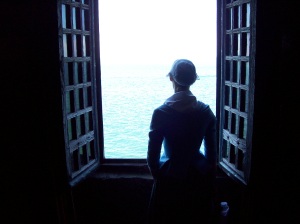
Window of Fort Niagara overlooking Lake Ontario! I am wearing a winged cap of sheerest cotton organdy and a fichu of sheer cotton.
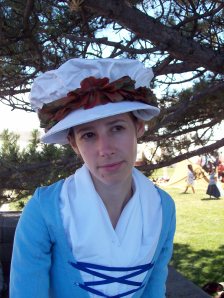
My favorite Bonnet of cream silk with orange/green changable silk trim. It keeps the sun off while looking stylish!

Mom’s robe Anglaise for the 1750′s. It’s open in the front for a stomacher. Made of heavy blue and cream striped cotton, it looks stylish and correct while being comfortable. Looks good with the new hat!
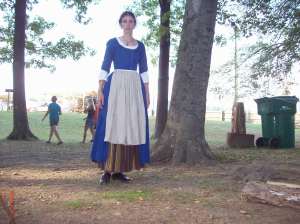
Blue silk/linen Robe D’Anglaise with ruching around the neckline. Rough linen apron with stroked gathers at waist. Striped petticoat of heavy cotton. White linen shift and cap. Despite how I look, I find this attire, especially the corset, very comfortable and easy to function in.
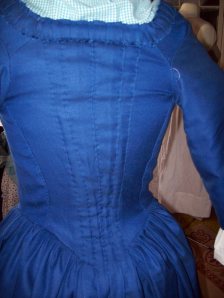
Back view of Robe D’Anglaise showing pleats and ruching.
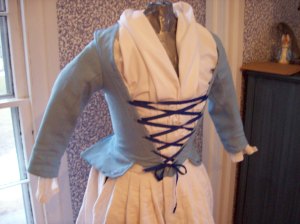
Blue linen jacket with embroidery on the peplums. Not as much worn as a gown, but good for “undress” occasions.
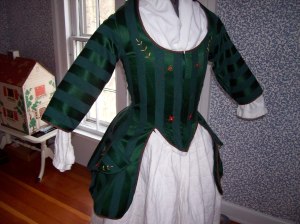
Green caraco jacket with embroidery on the pockets.

Jamming with friends on my cittern, Rosetta, at Ft Fredrick Market Days.
Accessories
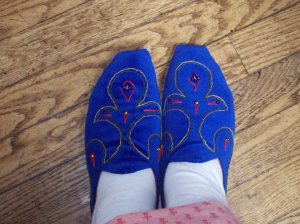
Blue velvet shoes from Harper’s pattern. Embroidered and beaded, lined in burgundy sateen. Canvas soles.

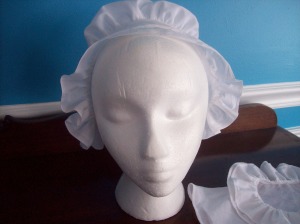
Cap and chemisette for 30′s gown.

Round travelbag of burgundy canvas with blue feather stitching. Buttons down the length and has two sturdy handles for carrying.
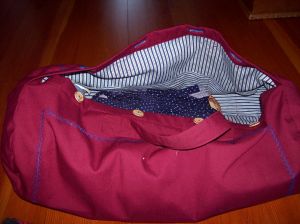
Lined with striped cotton and has pockets down both sides for small items.
Bonnets, caps, hoods, and hairnets
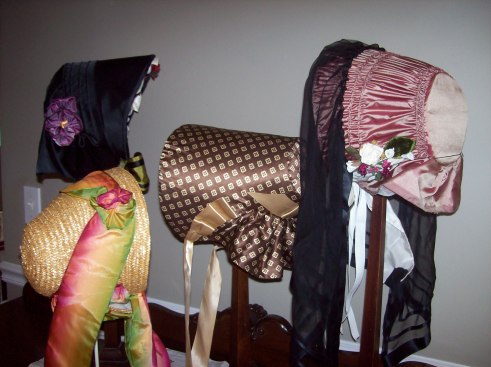
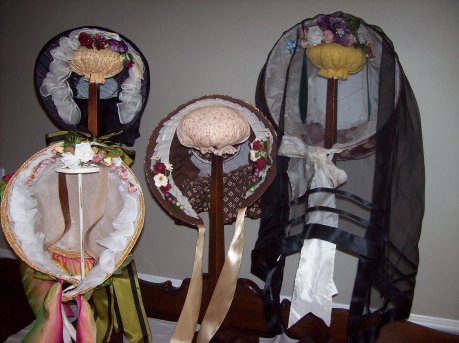
Can you tell I really like bonnets? I’ve
always been a hat girl, and I very much wish I could wear these bonnets
daily. They look pretty, and they hide any bad hair day! I also can make
bonnet veils of sheer silk gauze with silk ribbon.
NEW!! 1830′s poke bonnet!
Ball headdress of silk with silk ribbons and flowers of silk ribbon. Velvet leaves. 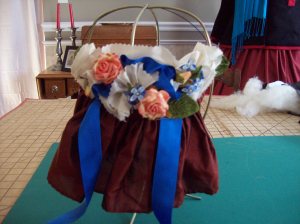

Headdress of forest green velvet with changeable orange/green silk ribbons and paper flowers. 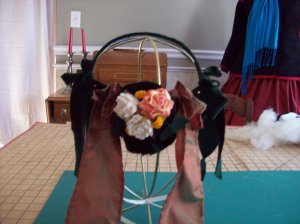

Net with pleated striped ribbon secured by glass beads.
Dresses
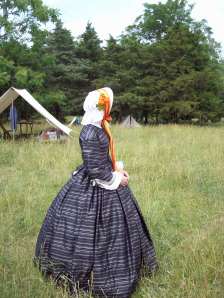
Black and silver striped silk dress with modified coat sleeves trimmed in grey silk ruching. Postilion back lined in gray silk. White undersleeves and collar.
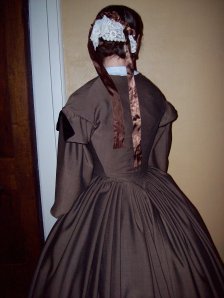
Wool dress with black jet buttons and velvet sleeve caps. Double pointed bodice in front and single point in back.

Worn with a shawl, gloves, and bonnet on a cool spring day.
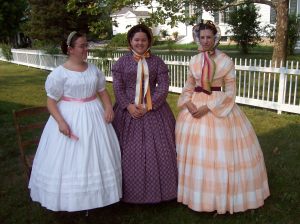
Sheer white dress for a young lady of cotton. Three tucks in skirt. Yoked bodice with short poof sleeves.
40′s dress of vine-stripe cotton. Fan front with narrow sleeves. Pointed bodice.
40′s sheer dress of peach and cream cotton. Fan front bodice with straight waist. Detachable lower bishop sleeves with ruffled sleeve cap.
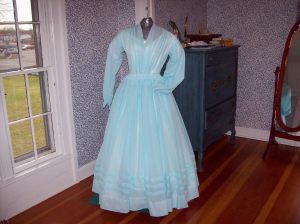
Sheer dress of cool blue lawn with three tucks in the skirt. The skirt is gauged onto a piped fan front bodice with half-high lining. Bishop sleeves.
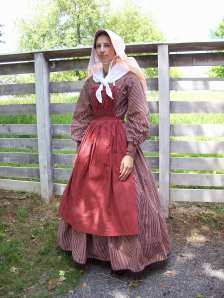
Striped work dress of cotton. Bodice is yoked with bias trim running around the shoulders and around the skirt. Sleeves are bishop with a wide pointed cuff taken from an original. Worn with a neckerchief, madder red apron, and sheer corded sunbonnet.
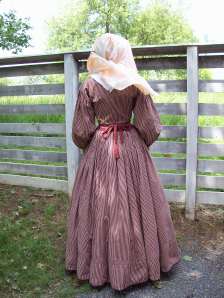
Back of striped dress.
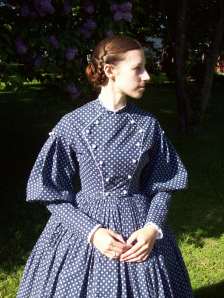
Military influenced dress with asymmetrical front opening. Blue “wool” with small diamond print. Single sleeve poof on a narrow sleeve with crochet buttons on the armseye and on the “bib” front. Stand up collar. Linen collar and cuffs.
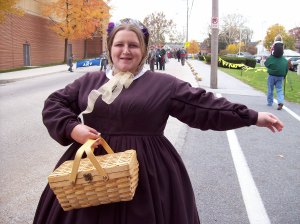
Plum wool dress with pleated coat sleeves. Velvet ribbon down the sleeves. Darted bodice and pleated skirt.
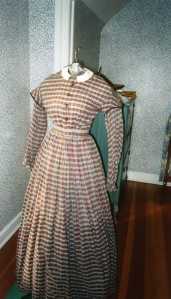
Modest dress of sheer plaid cotton with coat sleeves and sleeve caps. Bodice is gathered into the waistband as is the skirt. Antique painted buttons down front.
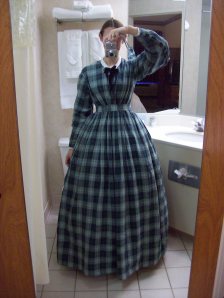
Dressy wrapper of plaid linen. Gauged waist with fan front. Belt of same fabric. Coat sleeves with bias ruching. V-neck with fine linen collar and cuffs.
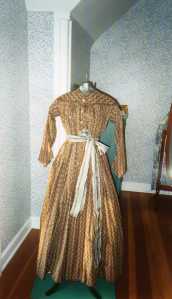
Wrapper that is more for working in of printed brown cotton. The front is gathered into a yoke, while the back is cut as for a normal dress. Coat sleeves.
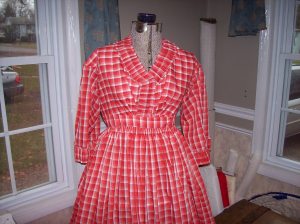
Sheer dress of small orange plaid cotton. Based on an original. Box pleated ruched on V-neck and sleeve edge. Gauged waist with waistband.
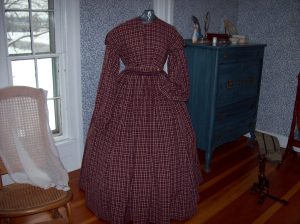
Dress of cotton plaid with gauged waist. Bishop sleeves with trifurcated sleeve cap. Waistband.
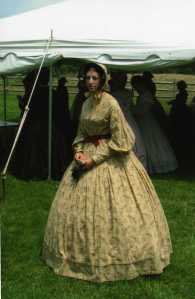
Fan front dress of printed cotton from the 1840′s. Sleeves are gauged into the elbow-length cuff. Skirt is gauged with a tuck. Pleats fall from the shoulders and cross down the front. Tiny lace edging lines the V neck. Red feather stitching at back, along sleeves, and down fronts. Worn with red belt and brown silk 40′s bonnet.
Kilts!
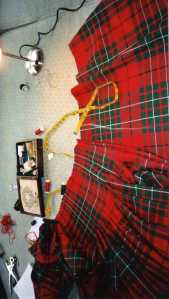
Menswear
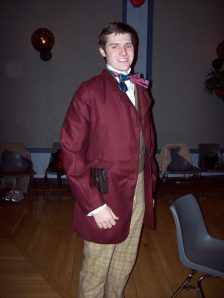
Burgundy wool paletot made by the wearer with my assistance. The pattern is from Devere’s 1855.
Trousers of plaid wool, also of Devere’s pattern.
Blue/red changeable silk cravat and shirt of white cotton made by the wearer.
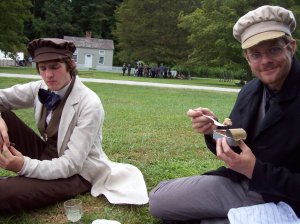
Gentleman on the right is wearing a cashmere mechanic’s cap with stiff linen brim. Black wool sack coat with wool batting quilting. Black silk cravat. Grey linen vest and trousers. Oysters not included.



Stuart and his linen sack coat based on the original
in plain linen that was at the Genteel Arts
Conference. Stuart’s is of striped linen.
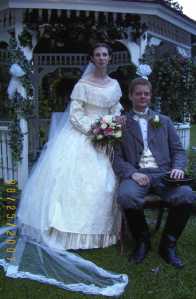
Husband is wearing a Newmarket coat (cutaway) of grey wool with matching trousers. Double-breasted vest of striped silk with gold ball buttons. Cravat of light blue plaid silk and pleat front shirt of fine cotton.
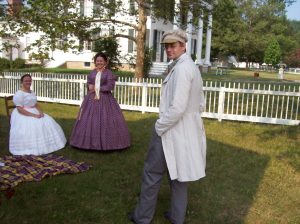
Linen frock coat, completely unlined, with felled seams and tail pockets.
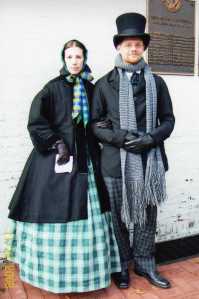
Black wool sack coat with grey and black plaid trousers. Wool scarf. Civilian shoes, gloves, and a top hat complete the ensemble.
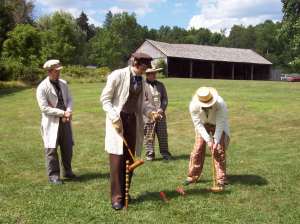
A fine group of civilian men, for which I am only a quarter responsible! I think that they were the coolest of us all in their linen coats.
Other time periods
1830′s is the new thing for me. I LOVE this fabric! The dress came out really well, but I don’t have a great pic of me wearing it yet.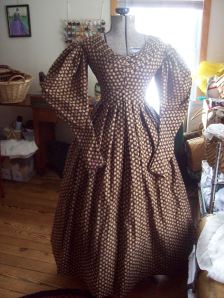

My modern wardrobe has become increasingly hand done as well. It’s fun, I get the fit and style I want, and I know how it’s constructed!

This print dress is of cotton, and uses some mid-19th century dressmaking techniques including bust darts, hem facing, a flat-lined bodice, piping at the neckline, hooks and thread eyes, and a pleated, hand attached skirt. There’s also a pocket in the skirt.
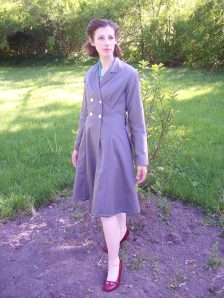
This raincoat is made of a waterproof cotton left over from a raincoat manufacturer. It uses princess seams for a good fit. It has MOP buttons.
Regency
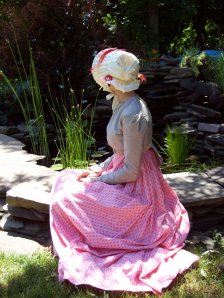
Regency ensemble of pink cotton with silk spencer in grey. Bonnet is of white satin with hand-made ribbon roses.
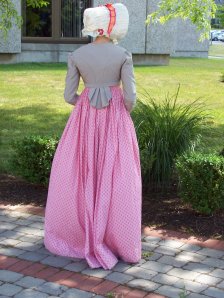
Back of dress shows box pleats and buttons of MOP. Neckline is sloping with poof sleeves. The spencer has a postilion in the back and narrow sleeves that go over the wrists.
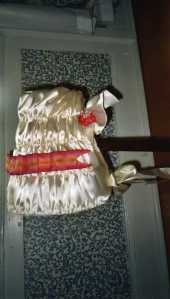
Bonnet is shirred with ribbon pleated on top. The curtain is very short and brim very deep. Silk ties.

Front of bodice is gathered while the skirt is flat.
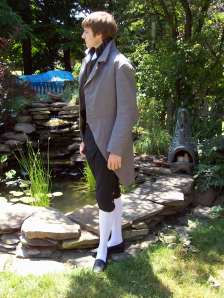
Newmarket coat (cutaway frock) from Devere’s of grey wool. Breeches of black linen.
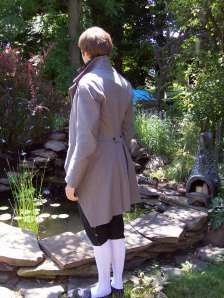
Back of coat showing silk covered buttons and tail pockets.
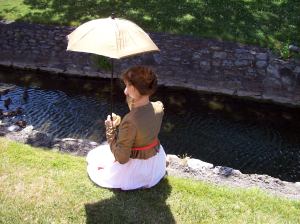
Spencer of copper silk with pleats around the bottom band. Long narrow sleeves and glass “bird’s eye” buttons. Parasol cover also of copper silk.
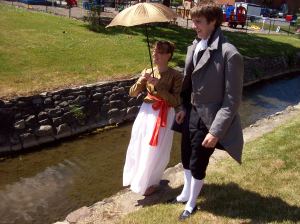
Feeding the ducks!
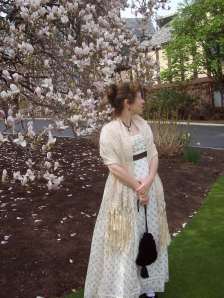
Gown of sheer cotton with brown print (used in a recent Jane Austen BBC production!) The front has bands of fabric across to accent bust. Chocolate brown silk waist and armbands. Tucks at hem. Lots of hand work.
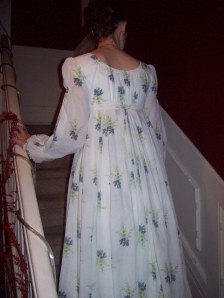
Copy of an original in sheer cotton print. Apron front with rows of piping around neckline. Long sleeves with alternate short sleeves. All hand done!
Women’s Outerwear

Complete Winter Ensemble consisting of:
Wool Meternich Sacque coat of flannel with velvet yokes and bias plaid trim. Quilted with wool batting and lined in green cotton sateen.
Hood of black wool, quilted with cotton and lined in plaid silk with matching ribbons.
Matching forest green velvet collar and muff with bias plaid lining and embellishments. Both quilted with wool batting.
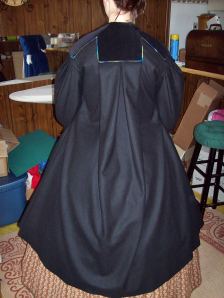 Rear view of the Metternich Sacque showing velvet yoke and sacque-back pleats.
Rear view of the Metternich Sacque showing velvet yoke and sacque-back pleats.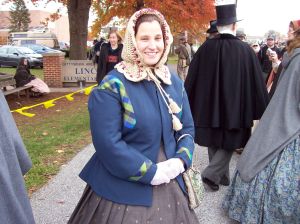
Blue wool paletot with coat sleeves embellished with bias plaid silk. It is quilted with wool batting and interlined with flannel. The lining is a black polished cotton.
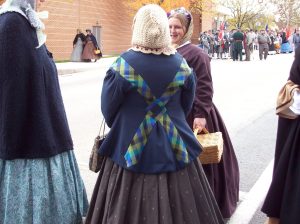
Back of the paletot showing trim.
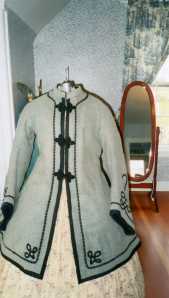
Grey wool paletot with braid trim. Open sleeves.
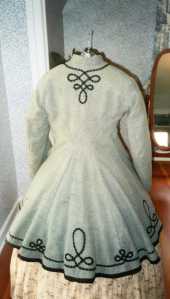
Braidwork on back.
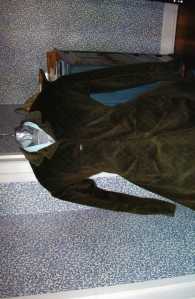
Jacket of textured sage green corduroy in a masculine style.
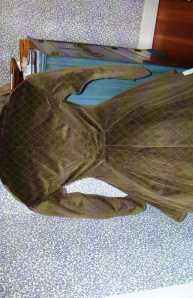
Pleated plackets at back. Lined in printed flannel with flap pockets on front.
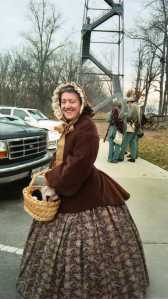
Brown corduroy jacket with open sleeves and gussets at back to create a graceful effect. Lined in tan flannel.

The same for myself in brown corduroy with flap pockets. This pattern was inspired from a Revolutionary war era caraco coat. Cut brass buttons.

Summer wrap of unlined striped sheer cotton. Mitered stripes at back with gathered section to create fullness. Open elbow length sleeves.
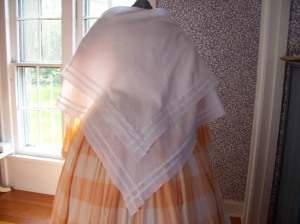
Shawl of sheer cotton gauze with three tucks for borders. Light for warmer weather.
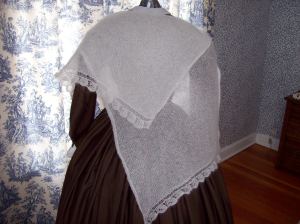
Knitted shawl of lace mohair with leaf border. Long and narrow, more of a scarf-shawl.
Underpinnings
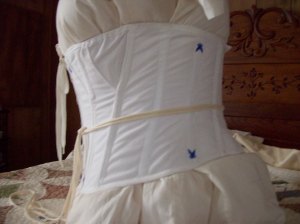
Corset of sturdy cotton twill with blue embroidery at bone tips. It’s displayed on a pillow, not a body!
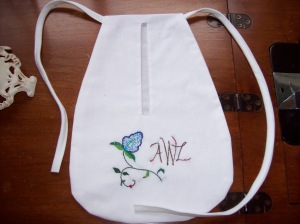
Embroidered pocket.
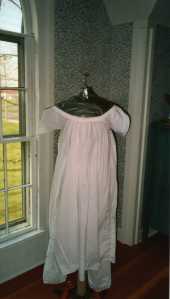
Summer chemise of light cotton gathered into a wide neckband. Short sleeves prevent being seen under a ballgown.
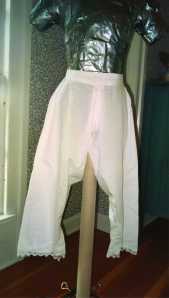
Drawers of cotton with tatting at the bottom. Split for ease.
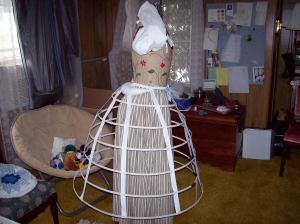
Cage crinoline of buckram covered wire with cotton twill tapes. Bumroll of cotton stuffed with wool batting. Displayed on Renaissance corset with embroidery and striped linen petticoat. (A little mixing of eras, here!)
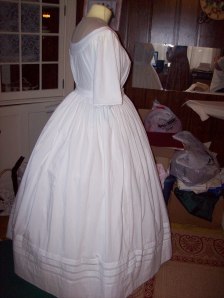
Chemise of white cotton. Petticoat of white cotton with several tucks and a deep hem. Waist is stroked gathered into a waistband that buttons.
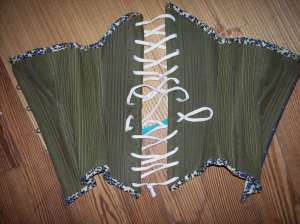
Early to mid-nineteenth century working corset of green linen. Boned with cane. Gussets and metal busk. Patterned cotton binding. These are the most supportive stays I have ever made.
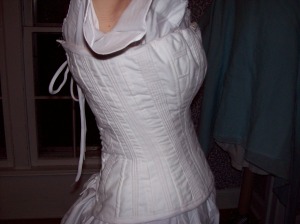
Entirely corded corset. Double layered of twill cotton with cotton cords run tightly through channels. No front busk. It gives much flexibility and some support, but gentle figure shaping. Straps can be added for more support.
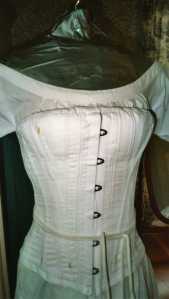
Corset that is partially boned and partially corded. The bones provide support and fashion shaping while the cords prevent wrinkling in the fabric.
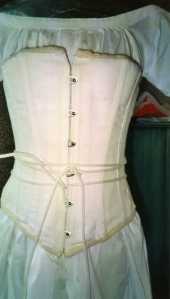
Fully boned corset of twill with tape binding. Straight seams with no gussets.
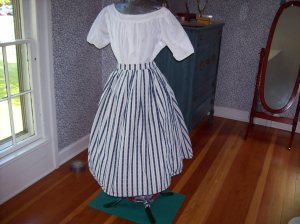
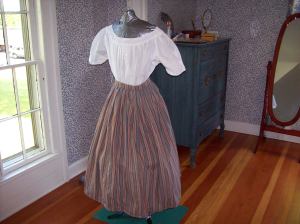
Work petticoats of substantial cottons in stripes. Worn under the dress, but exposed when the dress is tucked up, these sturdy skirts protect white underpinnings from dirt. They are hemmed shorter to allow freedom of movement.
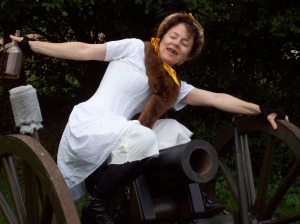
“Possum Polly” modeling how to wear underpinnings in an inappropriate setting! White cotton chemise. Boned corset of white drill with linen tape binding and bust gussets. Drawers of white cotton. Brown rat is not part of the “underpinnings” catergory!
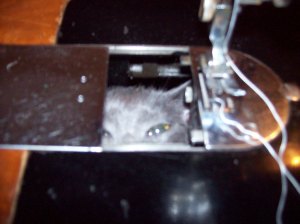



No comments:
Post a Comment